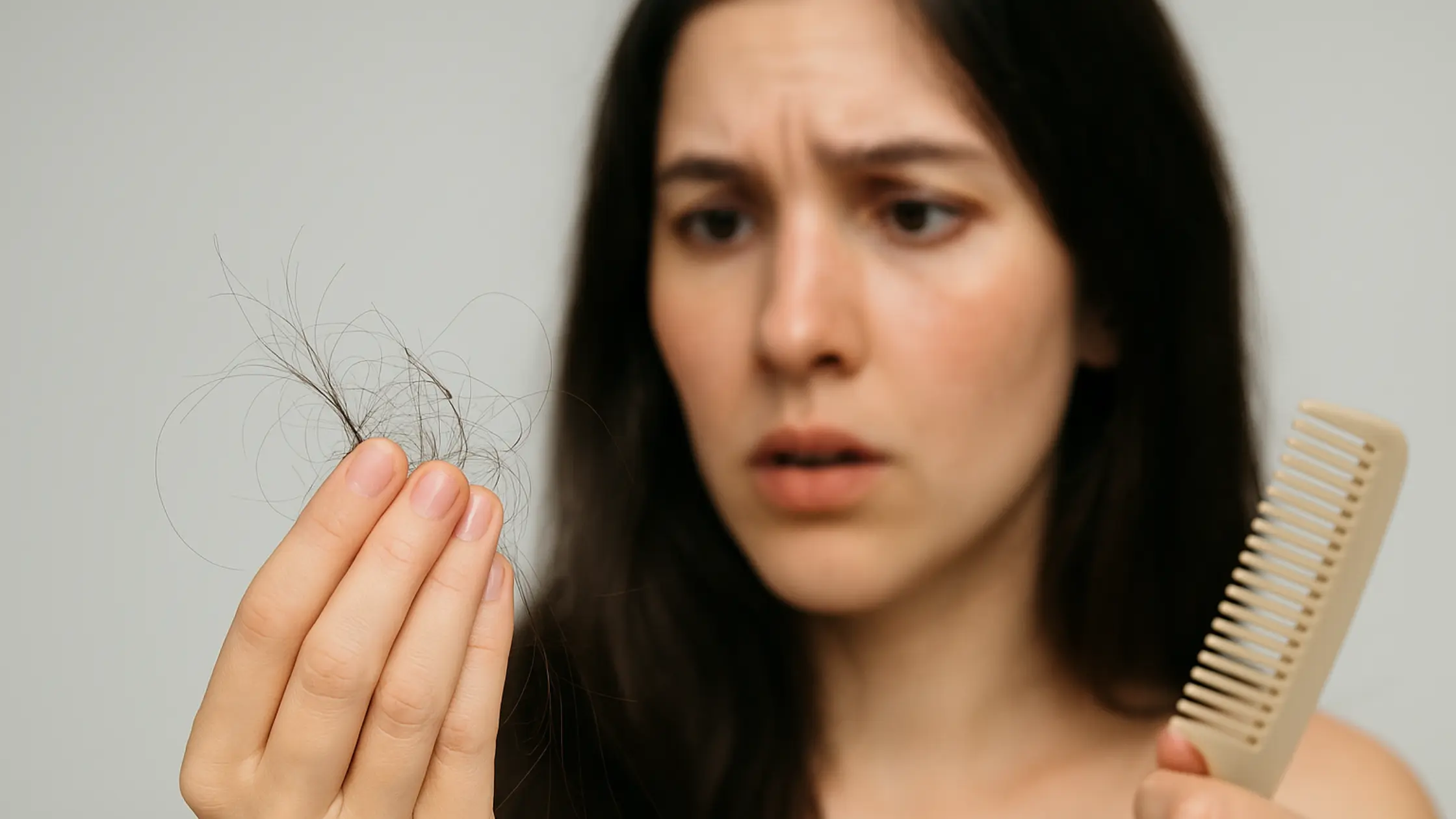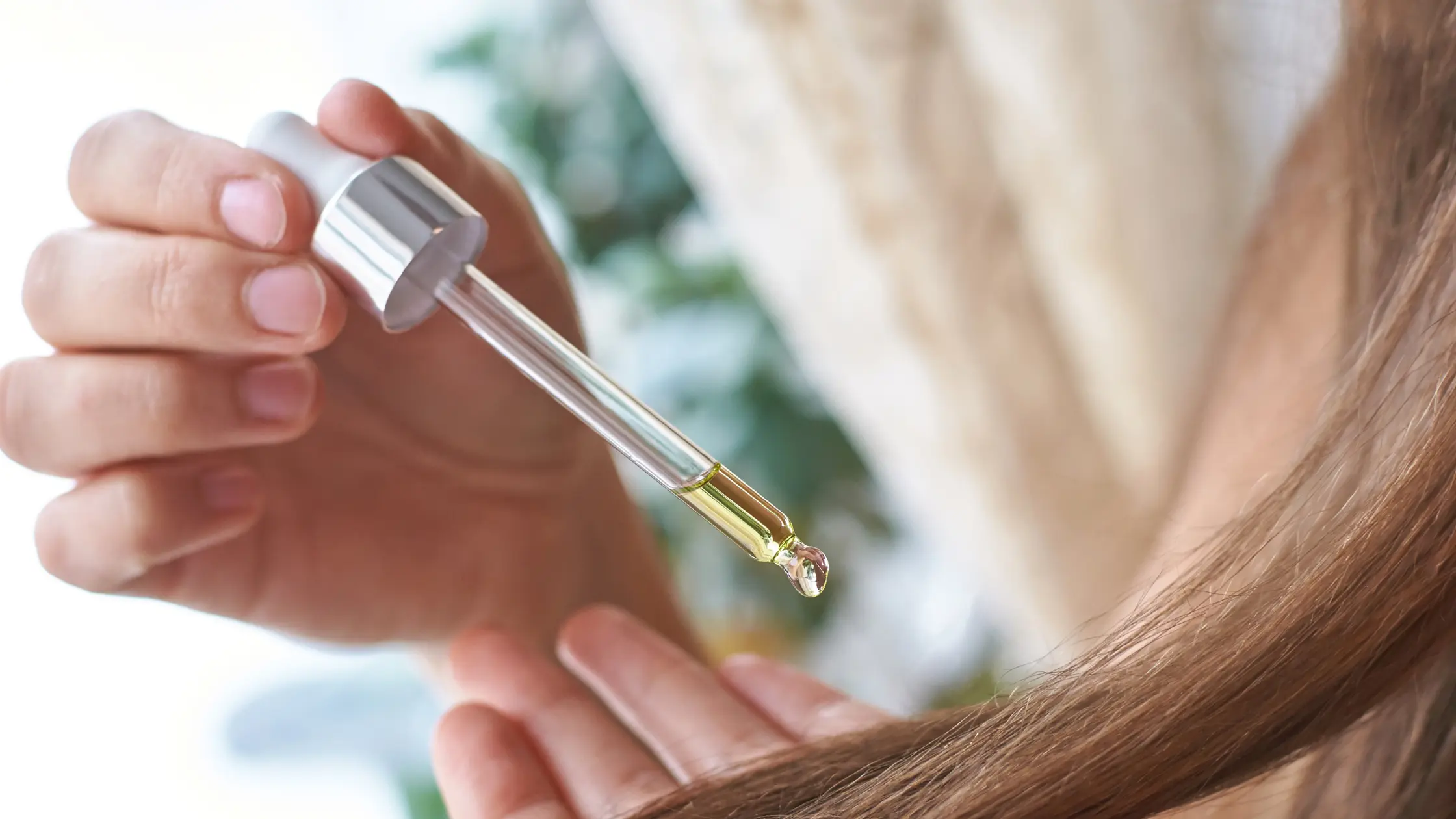When your thyroid throws a tantrum, your hair is often the first to rat you out. One day it’s a few strands on the pillow, the next it’s clumps circling the shower drain, thinning at the crown, and breakage so sneaky even your styling products can’t disguise it.
But here’s the silver lining: thyroid-related hair fall isn’t a life sentence.
With the right treatment, smart nutrition, and a little luxury-level hair care, your strands can bounce back even while your thyroid is still figuring itself out.
The Science Behind Thyroid And Hair Fall
Your thyroid gland produces hormones thyroxine (T4) and triiodothyronine (T3) that regulate metabolism, growth, and the hair growth cycle. When these levels go off balance, hair follicles enter a premature resting phase (telogen effluvium), which leads to shedding and thinning.
Hypothyroidism slows metabolism, making hair dry, brittle, and prone to breakage, with thinning across the scalp and sometimes even eyebrow loss while hyperthyroidism speeds up metabolism, leaving hair fine, fragile, and shedding faster than usual.
How To Decode Thyroid-Related Hair Fall?
The telltale signs of thyroid hair fall?
Signs to watch for include excessive shedding during brushing or showering, hair becoming noticeably dry, brittle, or thin, patchy scalp loss, hair loss from the outer third of the eyebrows (common in hypothyroidism), and slow regrowth despite good care. If these sound familiar, talk to your doctor about a thyroid function test.
Hair fall is a symptom, not the root cause. Sticking to prescribed medications and keeping your thyroid hormones (TSH, T3, and T4) within the optimal range, not just “normal” is the foundation. Regrowth usually takes 3 to 6 months of consistent control. Never stop medication when hair improves; relapses happen quickly.
The Expert-Approved Hair Care Routine for Thyroid Patients
This simple routine will help you control thyroid related hair fall:
- Gentle Cleansing: Use a sulfate-free shampoo for fragile strands. Try Laritelle shampoo or Svvimer shampoo or a gentle shampoo that tackles your hair fall problem.
- Conditioning: Strengthen bonds with Olaplex No.5 Bond Maintenance Conditioner.
- Deep Conditioning: Use Briogeo Don’t Despair, Repair! Mask weekly. It not only repairs your hair damage but also prevents hair breakage.
- Scalp Stimulation: Massage your scalp with anti-hair fall serums like The Ordinary Multi-Peptide Serum, Divi Scalp Serum, or Routine Wellness Nourishing Serum to boost follicle health.
- Amla Oil Massage: Rich in vitamin C and antioxidants, amla oil strengthens roots. Massage 2–3 times a week, leave atleast an hour, then shampoo.
- Guava Leaves Hair Rinse: Brew strong tea made out of guava leaves, cool it, and use as a post-shampoo rinse to soothe the scalp.
- Eucalyptus Essential Oil: Mix with a carrier oil, massage gently, and follow with hair steaming for better absorption.
- Avoid aggressive heat styling, bleach jobs, or tight ponytails. If you must use heat, apply a protectant.
- Swap harsh pillowcases for silk ones to prevent friction, and finish washes with a cold-water rinse to seal cuticles.
- Nutrients play a starring role in recovery. Deficiencies in iron, ferritin, zinc, ginseng, selenium, vitamin D3, vitamin B12, and biotin worsen hair fall. Always test levels before supplementing, excess biotin can interfere with thyroid blood tests.
- A thyroid-friendly hair fall control diet should include:
- Lean proteins like chicken, eggs, legumes
- Omega-3s from salmon or flaxseeds
- Biotin-rich foods like egg yolks, almonds, and oats
- Iron from leafy greens, lentils, or beef
- Antioxidants from berries, citrus, and colorful vegetables
- Avoid crash diets and intermittent fasting since they can slow regrowth.
Exclusive Expert Tips
- Track your thyroid with routine blood tests every 6 months.
- Manage stress with yoga, meditation, or simply 10 minutes of calm breathing.
- Get 7–8 hours of sleep and cut back on alcohol, smoking, or excessive caffeine. Stress spikes cortisol which worsens thyroid imbalances and speeds up shedding.
Supportive Medical Treatments
If hair loss persists despite thyroid control, doctors may recommend:
- Topical minoxidil to stimulate follicle growth
- Low-level laser therapy (FDA-approved devices) to boost density
- Platelet-rich plasma (PRP) treatments to awaken dormant follicles
When To Rule Out Other Causes
If you’ve managed your thyroid well, nourished your hair and body with a balanced diet, and cared for your scalp but still see major shedding, consult a dermatologist. Conditions like androgenetic alopecia, scalp infections, PCOS, or anemia may also be at play.
Over To You
Thyroid-related hair fall can feel like a beauty crisis, but it’s also one of the most reversible kinds of hair loss. By managing your thyroid, nourishing your body, upgrading your hair routine, and being patient, you can reclaim healthy, fuller strands. Regrowth takes 3 to 8 months, so celebrate baby hairs along the way and remember: your hair is a reflection of your health, and with the right care, both can thrive.








